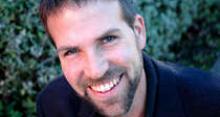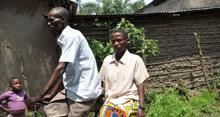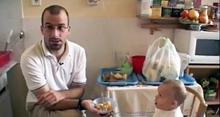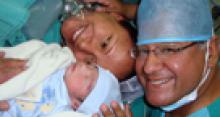HEROES
Heroes
Exclusive one-on-one interviews with extraordinary individuals working on behalf of women, children, and families worldwide.
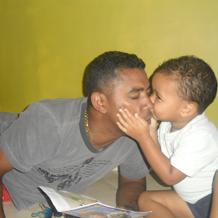
HIS DREAM
“Everything that I wish for my children I wish for all children: parents who take on their responsibility--not only to bring a child into the world, but be there to support them, to give them affection. I think that the father must do that. My dream for children is that they have a family that gives them a foundation of love and affection, and also supports their future endeavors, and that they are happy. This doesn't necessarily have to be the biological mother and father, but people who care, and set good examples.”
WHY HE’S A HERO
Márcio knows from personal experience that men who have had troubled relationships with their fathers can heal and become loving, nurturing fathers themselves. Márcio leads by example, helping other men become better fathers through Promundo’s workshops in his community.
A CHAT WITH HERO MÁRCIO CHAGAS DA PAZ
Tell me about your work with Promundo—why did you become involved?
It was through the work of Veronica, my wife. She participated in some of Promundo’s workshops. I began to also get involved with the workshops on themes like the relationship between men and women in the household, how to be a better partner and parent, that sort of thing. I enjoy the discussions, and trying to help other people within the group. A lot of these topics are not widely discussed, such as the participation of men in providing care to their children.
Tell me about your father. How did he affect how you parent your children?
Whenever I needed my father, he wasn't there. I have always thought about the fact that I did not have my father´s attention and knew how it felt. I didn’t want my son to feel the same way. I wanted to be different. At the school, my father was never there, even on special days that fathers were supposed to come. To be able to talk, play football with my father, all this I lacked. He was never there. I grew up thinking that this is important and that I wanted to be a different father. I had a very distant relationship with my father, and trying to be different is what most influenced me. I didn’t have anger so much as bitterness and hurt. After the workshop, it was as if I had been healed. I started to look at him without resentment, or bitterness, or anything. I was able to share my experience, and I found that the others had the same issues.
How would you define a good father?
Being a good father is, above all, to give attention. A child needs attention, affection and love, in addition to the basic things like food, health and entertainment. And of course children need to have fun. Being a good father is to provide this support to the child. Not only financial, but to also participate in their basic care. But the strongest thing a father can give is affection.
What is the most rewarding thing you’ve been able to do as far as helping other fathers in your community?
The most gratifying part was listening to stories very similar to mine, and also, to be able to talk about things that we normally keep only to ourselves. To be able to expose yourself, take off your mask and reveal things that you’ve kept inside for a long time and didn’t have the courage to say to anyone, not even to your son, that is very important. For you to see that the men you grew up with have the same feelings, anguish, and expectations in relation to yours is very comforting. For you to be able to hear their stories, and open the door of your own “room” that only you had the key, is a great relief.
This methodology that Promundo uses of telling our personal stories to each other has been very rewarding. Friends of mine had the same problems and have had the similar experiences growing up and I had no idea, because men are not accustomed to letting it all out and sharing these things. This program has really influenced people´s lives. Many men didn’t know how to open up before. They had the idea men shouldn’t cry.
What did you learn about the relations between men and women from your work with Promundo?
I’ve learned that we must above all respect. Respect the individuality of each and every one, and especially women. To show that to be a man it is not necessary to use violence, either physical or verbal. Verbal violence is one of the most lasting hurts, because it remains engraved in the mind.
Respect for the individuality of the woman above all is important. The woman has to have her work, she has to study, to have her space. Man should help the woman in the household tasks to make that possible. The partnership is something important. In other words, knowing how to divide the house tasks. If your wife arrives a little later, it does not hurt to tidy up the house, putting the clothes in the washer, cooking food, caring for the child. Even cooking classes, if I can do it, that’s cool.
What kind of father will your son be like?
I believe he is going to be a good father. I didn’t have a good example of a father who was close to me. My son has. At least I’m trying to give him that. This is the example that I’m trying to pass on to him. Parents are examples for children. I think he is going to be a good father. Even today, he already likes to help out in the house. We encourage this in him. We try not to argue in front of him as well. I play with him, give him attention, we talk.
How can people help to inspire better fathers?
People can help by sharing their ideas, writing stories and disseminating ideas about fatherhood. They can also support the policies that Promundo and its international partners are trying to implement by giving suggestions, gathering signatures for petitions, telling their personal stories, and supporting the adoption of laws that contribute towards the participation of fathers.
Take Action
Help Márcio realize his dream for fathers around the world. Visit Promundo at http://www.promundo.org.br/en/ and get started!
Related Content
|
Father and author Jeremy Adam Smith describes how being a father has changed over the years and what we need to call into question in order to redefine fatherhood. |
In Burundi culture, gender roles are strictly defined. Women and mothers have little power in their marriages and communities. Learn how Hatungimana Sylvestre is working to change these norms. |
This documentary follows a family in Hungary where the father stays home as caretaker and the mother is the primary breadwinner. |
Ariel Frisancho Arroyo, a doctor and maternal health activist in Peru, says that maternal health is not just a woman's issue, and encourages fathers to get involved in every aspect of pregnancy and child-rearing. |


